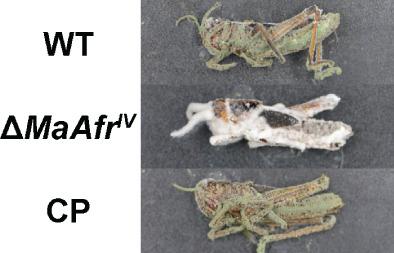当前位置:
X-MOL 学术
›
Pest Manag. Sci.
›
论文详情
Our official English website, www.x-mol.net, welcomes your
feedback! (Note: you will need to create a separate account there.)
Disruption of an adenylate-forming reductase required for conidiation, increases virulence of the insect pathogenic fungus Metarhizium acridum by enhancing cuticle invasion.
Pest Management Science ( IF 3.8 ) Pub Date : 2019-09-03 , DOI: 10.1002/ps.5576 Haoyu Guo 1 , Hongjuan Wang 1 , Nemat O Keyhani 2 , Yuxian Xia 1 , Guoxiong Peng 1
Pest Management Science ( IF 3.8 ) Pub Date : 2019-09-03 , DOI: 10.1002/ps.5576 Haoyu Guo 1 , Hongjuan Wang 1 , Nemat O Keyhani 2 , Yuxian Xia 1 , Guoxiong Peng 1
Affiliation

|
BACKGROUND
Metarhizium acridum, is a specific acridid pathogen developed for use against the migratory locust (Locusta migratoria manilensis). Adenylate-forming reductases (AFRs) include enzymes that are involved in natural product biosynthesis. Here, we genetically characterize the functions of a class IV AFR in M. acridum (MaAfrIV ) on fungal development and virulence.
RESULTS
Gene expression analyses indicated MaAfrIV was induced on locust wings early during the infection process. Surprisingly, loss of MaAfrIV increased virulence (25.20% decrease in the median lethal time) against the locust in topical bioassays but was no different than the wild type when the cuticle was bypassed by direct infection of conidia into the insect hemocoel. Virulence markers including protease (Pr1) expression and appressorial turgor pressure were higher in the mutant than the parent strain. No difference was seen in the expression of host immune genes (Toll pathway) or in polyphenol oxidase (PPO) activity in locusts infected by the ΔMaAfrIV or wild type strains. However, the ΔMaAfrIV strain was unable to successfully sporulate on dead cadavers.
CONCLUSION
Disruption of MaAfrIV increased fungal virulence by promoting insect cuticle invasion without altering host immune response or fungal immune evasion. Although loss of MaAfrIV conferred an apparent benefit to the fungus in terms of enhanced virulence, a significant trade-off was seen in the inability of the fungus to sporulate on the cadaver. As conidiation on the cadaver is essential for subsequent propagation in the environment, loss of MaAfrIV can reduce the engineering strains survivability in the field and improve the safety. © 2019 Society of Chemical Industry.
中文翻译:

进行分生孢子所需的形成腺苷酸的还原酶的破坏通过增强表皮的侵袭而增加了昆虫病原性真菌Meta桐的毒性。
背景技术Meta草是一种专门针对against游蝗(Locusta migratoria manilensis)而开发的特定a病病原体。形成腺苷酸的还原酶(AFR)包括天然产物生物合成中涉及的酶。在这里,我们从遗传上刻画了苹果酸杆菌(MaAfrIV)中IV类AFR对真菌发育和毒力的功能。结果基因表达分析表明,MaAfrIV是在感染过程的早期在蝗虫翅膀上诱导的。令人惊讶的是,在局部生物测定中,MaAfrIV的丧失提高了对蝗虫的毒力(中位致死时间减少了25.20%),但是当表皮被分生孢子直接感染到昆虫的血液中而绕过角质层时,与野生型没有什么不同。突变体中包括蛋白酶(Pr1)表达和腹壁膨压的毒力标记比亲本菌株高。在被ΔMaAfrIV或野生型菌株感染的蝗虫中,宿主免疫基因(Toll途径)的表达或多酚氧化酶(PPO)活性均未见差异。但是,ΔMaAfrIV株无法在死尸体上成功形成孢子。结论MaAfrIV的破坏通过促进昆虫表皮的入侵而增加了真菌的毒性,而没有改变宿主的免疫反应或真菌的免疫逃逸。尽管就增强的毒力而言,MaAfrIV的丧失赋予了真菌明显的好处,但在真菌无法在尸体上形成孢子的过程中,可以看到一个显着的权衡。由于尸体上的分生孢子对于在环境中的后续传播至关重要,MaAfrIV的丢失会降低工程菌株在野外的生存能力,并提高安全性。©2019化学工业协会。
更新日期:2019-09-04
中文翻译:

进行分生孢子所需的形成腺苷酸的还原酶的破坏通过增强表皮的侵袭而增加了昆虫病原性真菌Meta桐的毒性。
背景技术Meta草是一种专门针对against游蝗(Locusta migratoria manilensis)而开发的特定a病病原体。形成腺苷酸的还原酶(AFR)包括天然产物生物合成中涉及的酶。在这里,我们从遗传上刻画了苹果酸杆菌(MaAfrIV)中IV类AFR对真菌发育和毒力的功能。结果基因表达分析表明,MaAfrIV是在感染过程的早期在蝗虫翅膀上诱导的。令人惊讶的是,在局部生物测定中,MaAfrIV的丧失提高了对蝗虫的毒力(中位致死时间减少了25.20%),但是当表皮被分生孢子直接感染到昆虫的血液中而绕过角质层时,与野生型没有什么不同。突变体中包括蛋白酶(Pr1)表达和腹壁膨压的毒力标记比亲本菌株高。在被ΔMaAfrIV或野生型菌株感染的蝗虫中,宿主免疫基因(Toll途径)的表达或多酚氧化酶(PPO)活性均未见差异。但是,ΔMaAfrIV株无法在死尸体上成功形成孢子。结论MaAfrIV的破坏通过促进昆虫表皮的入侵而增加了真菌的毒性,而没有改变宿主的免疫反应或真菌的免疫逃逸。尽管就增强的毒力而言,MaAfrIV的丧失赋予了真菌明显的好处,但在真菌无法在尸体上形成孢子的过程中,可以看到一个显着的权衡。由于尸体上的分生孢子对于在环境中的后续传播至关重要,MaAfrIV的丢失会降低工程菌株在野外的生存能力,并提高安全性。©2019化学工业协会。






























 京公网安备 11010802027423号
京公网安备 11010802027423号